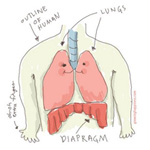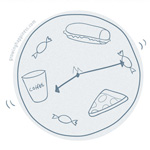Bad Sleep Day - Polyphasic Sleep Update
Despite being really tired yesterday (running around a number of places lugging two heavy bags continously for 6 hours), I was well-rested and productive at night:
Yesterday
6.30am-12.30am: Sleep
1-7pm: On my feet
8pm-11pm: Slept 3 hours. Woke up refreshed
11pm-6.30am: Work

Today is a different story. I had 3 interrupted sleep periods and was very sleepy and unproductive the whole day.
Today
7am-9.45am: Slept for 2hr45min, woken up by a phone call
9.45am-1.45pm: Work
1.45pm-2pm: Decided to do some light workout. Still sleepy
2pm-3pm: Took a nap
3pm-4pm: Phone rang. Talked for an hour
4pm-9pm: Home
9pm-11.30pm: Intended to sleep for 3 hour but awaken by cat at hour 2.5. Another interrupted sleep cycle means waking up feeling terrible.

Here’s a nicely illustrated article on How to Nap. It should have included the all-important tip — “Remove cat from room.”
Improvement to the current natural polyphasic sleep system: I will limit my afternoon naps to between 20 and 45 minutes on days I’m expecting an important phone call by setting an alarm.
Natural Polyphasic Sleep Pattern
I’ve fallen into a biphasic/polyphasic sleep pattern the last couple of months. I didn’t plan this but it seems to be doing me a lot of good so far. A weekday may go something like this:
9pm-4am (7hr): Work
4am-8.30am (4.5hr): Sleep
8.30am-4pm (7.5hr): Work + Nap (90min-3hr)
4pm-9pm (5hr): Home (family time, cooking, cleaning)
I usually sleep 4.5 or 6 hours straight for my main sleep period. The total number of hours for this is usually in multiples of 90 minutes, which is a unit of my sleep cycle (in case you’re wondering, I wake up to a giant Ikea clock so it’s really easy to tell the time). To wake up at the end of one of these 1.5-hour cycle is ideal – I’ll feel well rested and will wake up without any grogginess.
The duration of my nap in the day depends on how much I got for my main sleep period at night. I wake up mid-cycle during my naps a little more often than my main sleep period because of phone calls.
The best day (feeling full of energy, brimming with ideas, very productive) I had this week was polyphasic that went like this:
6am-9am (3hr): Sleep
9am-1pm (4hr): Work
1pm-4pm (3hr): Sleep
4pm-9pm (5hr): Home
9pm-10.30pm (1.5hr): Sleep
10.30pm-5am (6.5hr): Work
5am-10am (6hr): Sleep
Getting used to Biphasic or Polyphasic Sleep Pattern
A divided sleep pattern may or may not be for you. Many people I know are satisfied and perform well with the usual monophasic sleep pattern. If you are one of these people, I don’t see why you need to change your sleeping habits. But if you are like me, always struggling to stay at my peak performance level in throughout the day, then this is worth a shot.
People starting on a biphasic sleep routine may experience extreme sleepiness during the first few days. I think, and this is not supported by any research, it is better to gently ease yourself into it instead of forcing yourself to conform to a fixed time. Everyone is different and you know your own body best, so it’s difficult to follow someone else’s sleep routine with the same amount of success they had.
Here’s a suggestion (again, this is just a suggestion, you know your body best). You can start by identifying how long is your sleep cycle is (do this on a weekend or when you’re not working). Then reduce the amount you sleep at night by one sleep cycle (if you are currently doing 5 cycles of 90 minutes, try 4 x 90 instead). You will find that some time in the middle of the day you need to take a nap, go ahead. I do not set a specific time I need to be asleep/wake.

Benefits of Polyphasic Sleep
Higher energy/More productive hours
One of the main benefits is that my alertness level is on an all-time high. That dip in the middle of the day is now replaced by a reviving nap. I had also long suspected I’m a nocturnal worker and this is proven true in the current system — I’ve accomplish so much more (completed nearly twice normal workload) during the main work shift at night. I’ve also managed to sneak in a couple of minutes of workout daily now. So for people who have the tendency to feel sluggish in the middle of the day or who work best in the quiet of night, you may wanna try biphasic or polyphasic sleep.
Less stress
Dividing my work day into two shifts has yielded incredible results. I feel less stressed about work in the day. I like to do a lot of planning and brainstorming before delving into the actual work stuff so to know that I have another shift at night is great. It’s like I have an additional work day every day.
Improve international relations (!!!)
I respond to clients from different time zones more promptly now because I am working “round the clock”. I can see full-time bloggers taking advantage of this system, especially when you audience is a few GMT hours ahead or behind you.

When Biphasic or Polyphasic Sleep Might Not Work
While Travelling
Though my current sleeping habit started when I was traveling by rail around Europe (a couple hours here and there), I don’t see a good way you can incorporate a nap into a day of sightseeing. Unless of course, you are traveling on your own RV.
When the other half is not a willing participant
To actually have long-term success with segmented sleep, one may need to sleep alone or have a partner who is willing to be on a similar sleeping pattern. Lucky for me my husband and I sleep around the same times.
Days when you need to meet multiple clients/friends
Well, your social life have to continue, right? Unless you choose exist only in the virtual world or get all your friends and family into this.
You work in an office/outdoors/need to stick to certain work hours
A few offices have introduced power naps to increase productivity of their staff but overall but this is still not the norm.

Notes
- I don’t have an alarm clock set unless I have an appointment. When I feel sleepy, I just go to bed, when I have enough rest, I’ll naturally wake up.
- I have a cup of coffee on weekdays, anytime from 10am-4 pm. It doesn’t seem to affect my naps.
- I usually adopt a monophasic sleep pattern on Saturdays because I am out and about doing stuff. I zonk out after lunch but this is fixed with an espresso.
- Before this I usually sleep about 7 hours at night. I bought into the believe that 7 or 8 hours of sleep is the ideal time for an adult human and set my alarm accordingly. I didn’t know much about sleep cycles then. 7.5 hours is ideal for me but that doesn’t stop me from feeling drowsy in the middle of the day.
- I have been having more lucid dreams these past few weeks. In one of the dreams, I made Daniel Craig meet me in Thailand. In a tux. As James Bond. And then we built a school for disadvantaged kids. Ahem!
Sleepy Tales
Lucid Dreams and Segmented Polyphasic Sleep
“It’s possible to dream what you want to dream!”
I’ve been sleeping an average of 5 hours a night the past few weeks with an nap at in the afternoon and sometimes if I’m still sleepy, another nap early evening. I see this continuing for at least another month (especially with the Euro 2008 matches to watch in June!).
My dreams are more vivid now, and now more than ever, I’m aware of the fact that I’m dreaming and can control my dreams. I recently found the term for this:
Lucid Dream
“A lucid dream, also known as a conscious dream, is a dream in which the person is aware that he or she is dreaming while the dream is in progress. A lucid dream can begin in one of two ways. A dream-initiated lucid dream (DILD) starts as a normal dream, and the dreamer eventually concludes that he or she is dreaming, while a wake-initiated lucid dream (WILD) occurs when the dreamer goes from a normal waking state directly into a dream state with no apparent lapse in consciousness.” Wikipedia
Apparently, you can learn how to achieve lucid dreams. So it’s possible to dream what you want to dream!
Segmented Sleep
I’ve not experienced any adverse effects from the reduced number of sleeping hours apart from feeling very sleepy after lunch (then again, I’ve always been sleepy after lunch with or without enough sleep), and this is relieved by taking a nap.
I was slightly worried about the effects it would have on my body but the article What is a natural sleep pattern? on Scienceblogs is reassuring to a degree:
“In a natural state, humans do not sleep a long consecutive bout throughout the night. The natural condition is bimodal – two bouts of sleep interrupted by a short episode of waking in the middle of the night.”
Steve Pavlina took segmented sleep a step further by experimenting with Uberman or Polyphasic sleep, dividing his sleep into 6 half-hour segments and sleeping a total of 3 hours a day for nearly half a year. Yikes!
Given a choice, I think I’d still prefer to sleep 7-hour straight at night but at least I can rest in relative comfort now. :)








